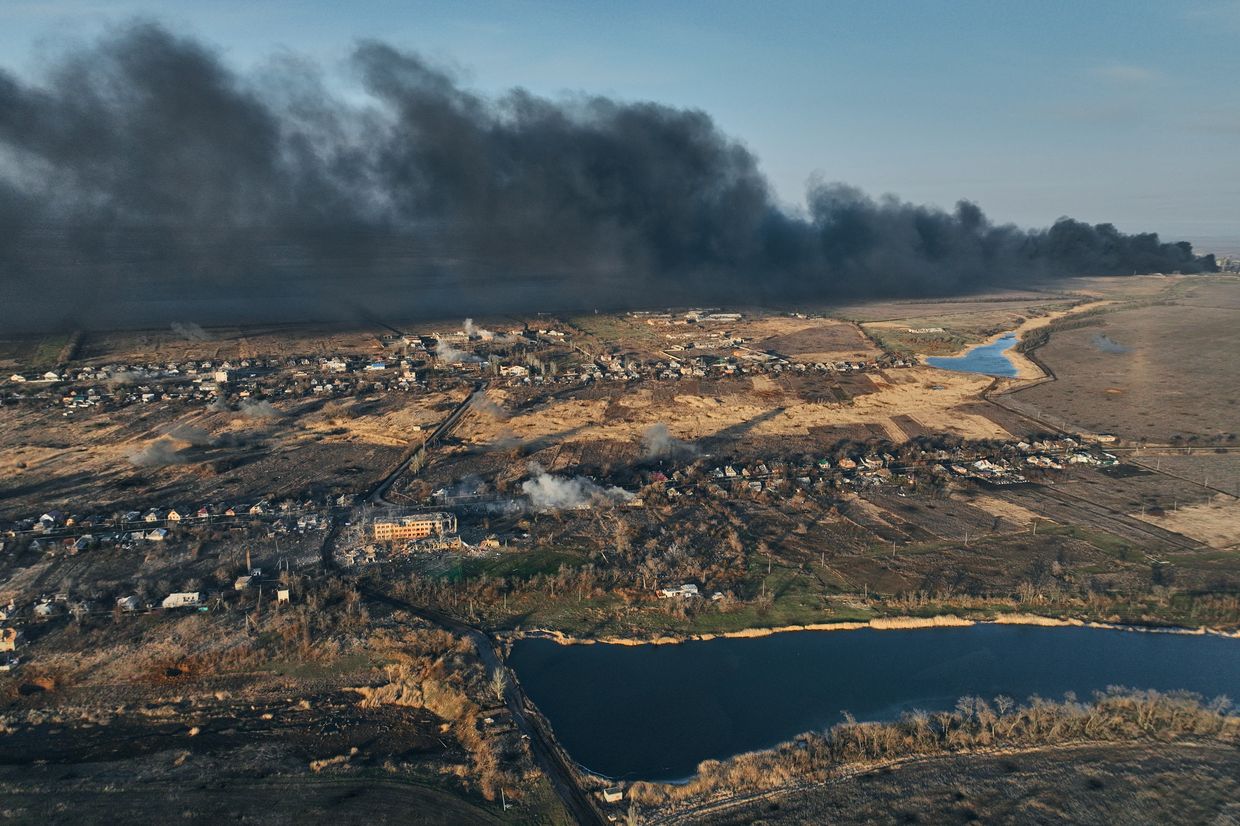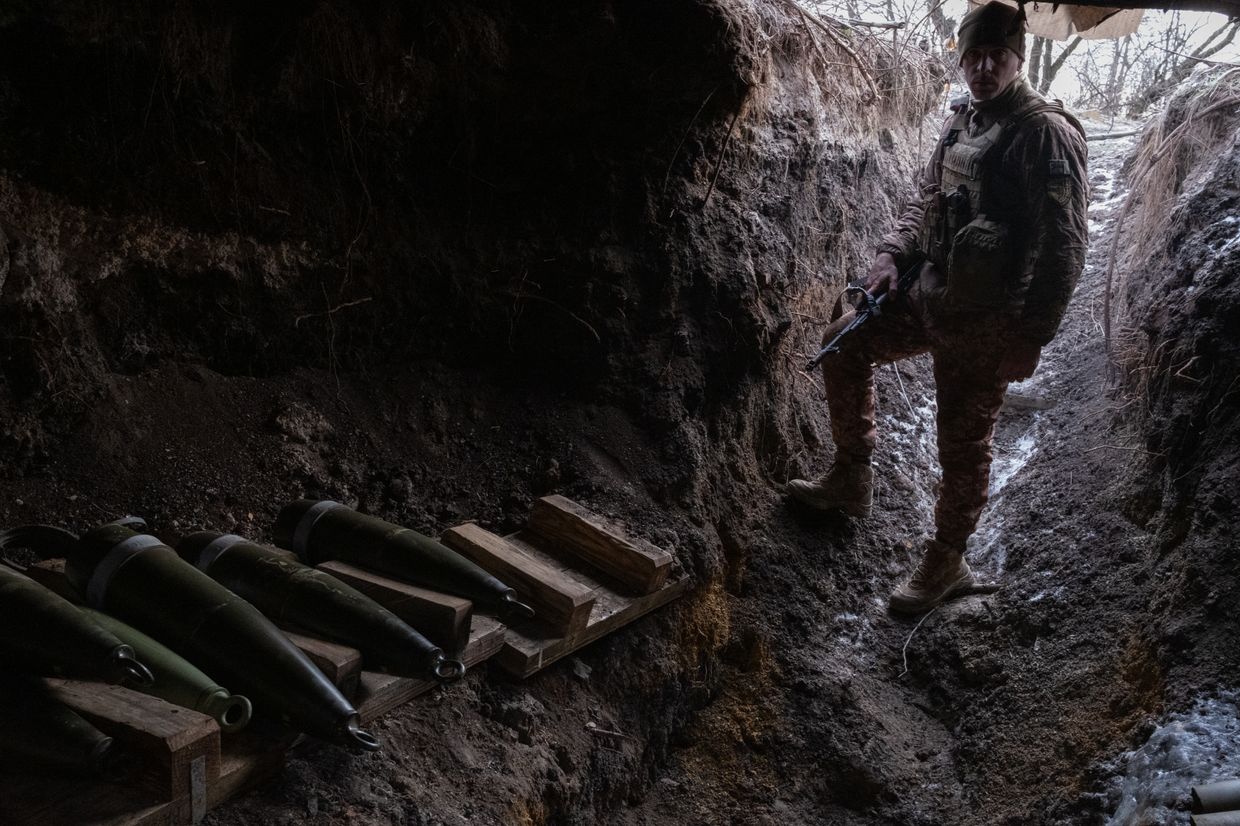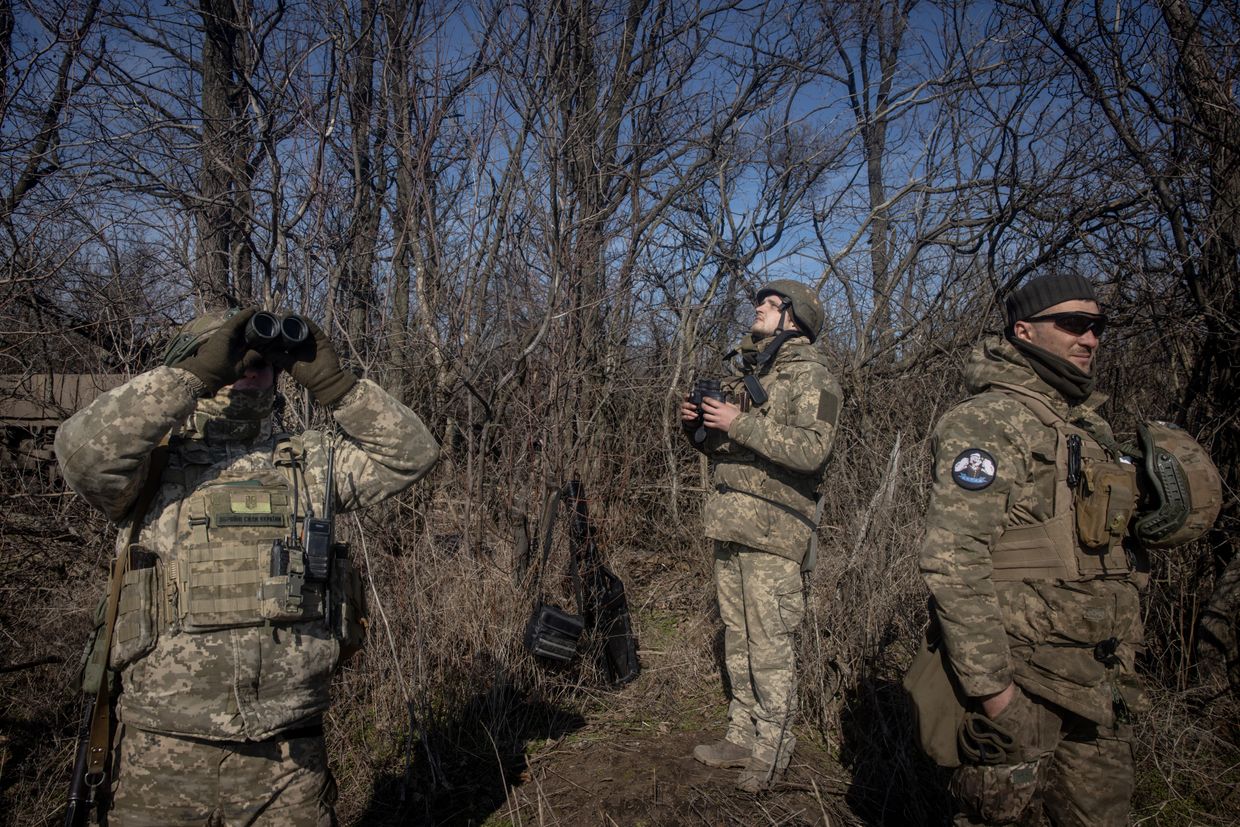Ukraine war latest: Ukraine withdraws from Lastochkyne, Syrskyi prepares two war plans contingent on US aid

Key developments on Feb. 26:
- Military: Ukraine withdraws from Lastochkyne near Avdiivka
- Syrskyi drawing up two war plans contingent on US aid, Zelensky says
- Scholz again rules out Germany's delivery of long-range Taurus missiles
- Kuleba calls for Europe to suspend ammunition sales to third countries
- Military intelligence: Russia plans to produce 2.7 million shells this year
Ukrainian forces have withdrawn from the village of Lastochkyne near the recently captured Avdiivka in Donetsk Oblast, Dmytro Lykhovii, a spokesperson for Ukraine's Tavria Group, said on national television on Feb. 26.
Lykhovii explained the decision by Ukraine's need to set up defenses near the neighboring settlements of Orlivka, Tonenke, and Berdychi and prevent further Russian advance in the western direction.
Lastochkyne is a small village that lies around three kilometers west of the northwestern outskirts of Avdiivka.
A day before, Lykhovii told Hromadske media outlet that Ukrainian troops had retreated to the western outskirts of Lastochkyne and established defensive positions there.
Ukrainian forces withdrew from the small industrial city of Avdiivka in Donetsk Oblast on Feb. 17 amid ammunition shortages after months of repelling Russia’s renewed offensive.
Following the capture of Avdiivka, Russia has intensified its offensive efforts across several sectors of Ukraine’s front line, likely in order to stretch Ukrainian forces, the U.K. Defense Ministry reported in its Feb. 21 intelligence update.
The Institute for the Study of War (ISW) warned that Russia could replicate its successful tactics in Avdiivka on a larger scale if the West continues to delay military assistance.
Syrskyi drawing up two war plans contingent on US aid, Zelensky says
Ukraine's Commander-in-Chief Oleksandr Syrskyi is developing two versions of the war plan in case Kyiv receives U.S. aid, and if it does not, President Volodymyr Zelensky said in an interview with CNN, published on Feb. 26.
On Feb. 13, the Senate passed the bill, which contains $61 billion in aid for Ukraine, after months of deadlock, but has for now still been blocked from the floor of the Republican-led House of Representatives.
According to Zelensky, without U.S. assistance, Ukraine will struggle in 2024 not only to prepare for a new offensive but to simply defend along the current front line.
One version of Syrskyi's plan assumes that if Washington provides assistance, Ukraine will be able to start pushing back Russian troops, and if not, it will focus on defense, the president said.
Zelensky noted that he has discussed funding for Ukraine with U.S. House Speaker Mike Johnson, who has so far refused to put the bill to a vote in the U.S. House, instead declaring recess until the end of February, and said he “was feeling optimistic” after the conversation.
“If they (U.S.) will change their minds, it’s a big problem for us,” Zelensky said, adding that he had asked U.S. President Joe Biden to have Democrats and Republicans meet to reach a deal on aid for Ukraine.
Delays in U.S. aid have already had an impact on the ground in Ukraine. The loss of Avdiivka, a city in Donetsk Oblast that has been on the front line since 2014, was linked to shortages in artillery shells and other supplies provided by the West.
Scholz again rules out Germany's delivery of long-range Taurus missiles
German Chancellor Olaf Scholz reiterated his refusal to send Ukraine long-range Taurus missiles at a press conference on Feb. 26, days after the German parliament rejected a measure explicitly calling for Taurus to be provided.
Taurus missiles, which have a range of up to 500 kilometers (310 miles), have been the subject of extensive discussion since Ukraine submitted a request to acquire the weapons in May 2023.
Scholz is reportedly against sending Taurus missiles to Kyiv because he fears the move will draw Germany into the war. Ukraine has received other long-range missiles, such as the Storm Shadow/SCALP from the U.K. and France and ATACMS from the U.S.
Germany's parliament supported a motion to deliver unspecified long-range weapons to Ukraine on Feb. 22, the same day it rejected sending Taurus missiles.
Scholz repeated past claims at the Feb. 26 press conference that the targeting system for the Taurus is different from those used in the Storm Shadow and SCALP and cannot be done from Germany.
In previous arguments about why Germany could not send Taurus missiles, Scholz said he was concerned German personnel would have to be on the ground in Ukraine to help the missile targeting process, which he has ruled out.
Scholz again rejected the direct participation of German soldiers in the targeting of Russian forces on Feb. 26 and said there could be no German troop presence in Ukraine.
The tenor of the debate surrounding Taurus missiles is "very irritating," said Scholz, adding that there is an unnecessary focus on the Taurus when Ukraine's ammunition shortage is a more pressing concern.
After months of impasse in the U.S. Congress over aid to Ukraine, the U.S. military assistance has effectively run dry, which has begun to impact Ukraine's battlefield capabilities.

Kuleba calls for Europe to suspend ammunition sales to third countries
Europe should suspend ammunition exports to third countries other than Ukraine in light of the shortages faced by the Ukrainian military, Foreign Minister Dmytro Kuleba said in an interview with RedaktionsNetzwerk Deutschland (RND) published on Feb. 26.
Kyiv is being confronted with critical shortages of ammunition, as $61 billion in funding from the U.S. remains stuck in Congress, causing defense aid deliveries to run dry.
Reports suggest Ukraine could face a catastrophic shortage of ammunition and air defenses within weeks.
"All contracts for the export of ammunition produced in Europe to third countries must be put on hold, and all such ammunition should be sent to Ukraine," Kuleba told RND.
"Every cartridge produced in Europe should serve the purpose of defending Europe."
Ukraine's European allies are aware of the lack of ammunition and have admitted they were "too late" in deciding to "ramp up their own production, sign long-term contracts, and put new production lines into operation," according to Kuleba.
"Unfortunately, we are now paying for these mistakes." The European Union's top diplomat, Josep Borrell, said on Feb. 19 following a meeting of EU foreign ministers in Brussels that he urged member states to procure ammunition for Ukraine outside the bloc if this source of supply is "better, cheaper and quicker."
Military intelligence: Russia plans to produce 2.7 million shells this year
Russia plans to produce 2.7 million shells in 2024, an increase from around 2 million 122 and 152 mm shells manufactured by the country last year, Vadym Skibitskyi, the deputy head of Ukraine's military intelligence agency (HUR), told Interfax Ukraine.
Russia has a significant advantage in the number of ammunition on Ukraine's front lines, firing around three times more shells per day than Ukrainian forces, according to a document prepared by Defense Minister Rustem Umerov and seen by Bloomberg.
Russia's goal to produce 2.7 million shells "requires, first of all, modernization of production, putting back (inactive facilities) in operation or creation of new lines (of production)," Skibitskyi said in an interview with Interfax Ukraine.
"That is why we are asking our partners that the sanctions should be aimed at machines, at components for electronic chips, microcircuits, and so on."
As well as producing new ammunition, Russia refurbishes Soviet stocks of artillery ammunition, bringing the amount available to "3-4 million units in 2023," Estonia's Foreign Intelligence Service said in a report published on Feb. 13.
Russia is also receiving new supplies of ammunition from abroad, with North Korea reportedly becoming Russia's largest arms supplier.
Russia has so far received 1.5 million 122 mm and 152 mm shells from North Korea, Skibitskyi said. "These shells are 70-80 years old, and half of them do not work," he added.















